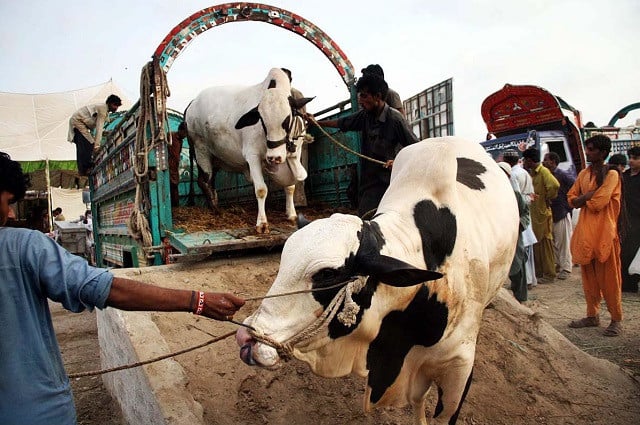Eid-ul-Adha Slaughter Services
The Meat Merchants Association in Karachi has officially announced the rates for animal slaughtering services for the upcoming Eid-ul-Adha.
This announcement has garnered widespread attention due to the significant costs involved, reflecting the association’s efforts to set standardized prices for this important religious event.
According to the Meat Merchants Association, the cost of slaughtering a heifer on the first day of Eid will be set at Rs20,000.
This high price has raised eyebrows among many, as it represents a considerable expense for those participating in the traditional sacrifice.
The rate for sacrificing a goat has been set at Rs10,000, which, while lower than the cost for a heifer, is still a substantial amount for many households.
For those opting to slaughter a camel, the fee is even higher, fixed at Rs40,000. This reflects both the size and complexity of handling such large animals, as well as the greater communal aspect often involved in camel sacrifices, where the cost might be shared among several families.
Nadeem Qureshi, a representative of the Meat Merchants Association, provided additional context regarding the pricing structure.
He explained that the rates for the second and third days of Eid would see a significant reduction, dropping to nearly half of the initial day’s prices.
This adjustment is aimed at making the process more accessible to a broader range of people over the duration of the three-day festival.
Qureshi emphasized that these rates were set after considering various factors, including the costs associated with hiring skilled butchers, transportation, and the overall logistics of managing the high demand during Eid-ul-Adha.
He also highlighted the need for maintaining quality and ensuring that the sacrificial rites are performed correctly and respectfully, which necessitates the involvement of experienced professionals.
The announcement has sparked discussions among the community, with some expressing concerns over the affordability of these services.
Eid-ul-Adha, also known as the Festival of Sacrifice, is a significant religious event where Muslims commemorate the willingness of Ibrahim (Abraham) to sacrifice his son as an act of obedience to God.
The tradition involves sacrificing an animal and distributing the meat among family, friends, and the less fortunate, embodying the values of charity and communal support.
In light of the high costs announced, there have been calls for better coordination and possible subsidies to help lower-income families participate fully in the religious festivities.
Some community leaders are advocating for collective sacrifices, where multiple families pool resources to afford a single animal, thereby sharing the cost burden.
Overall, the official announcement by the Meat Merchants Association underscores the logistical and financial considerations involved in organizing large-scale sacrificial services.
As Eid al-Adha approaches, it remains to be seen how these rates will impact the traditional practices and whether any further adjustments will be made in response to public feedback.
The dialogue between the association, community members, and religious leaders will be crucial in ensuring that the spirit of Eid-ul-Adha is upheld in a manner that is inclusive and respectful of all participants.










